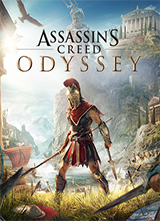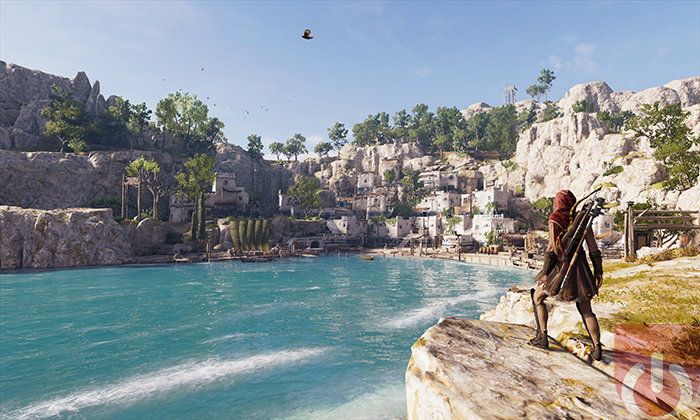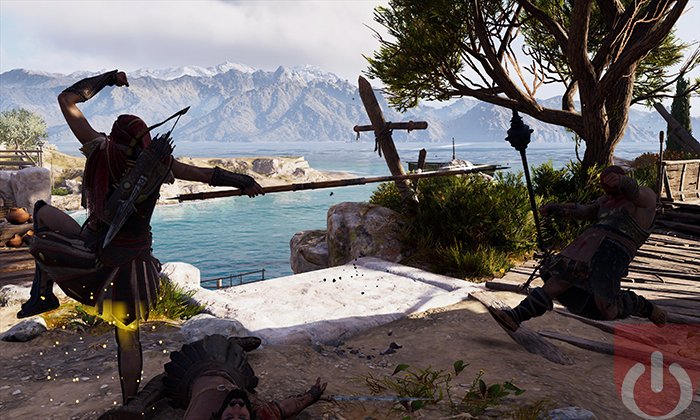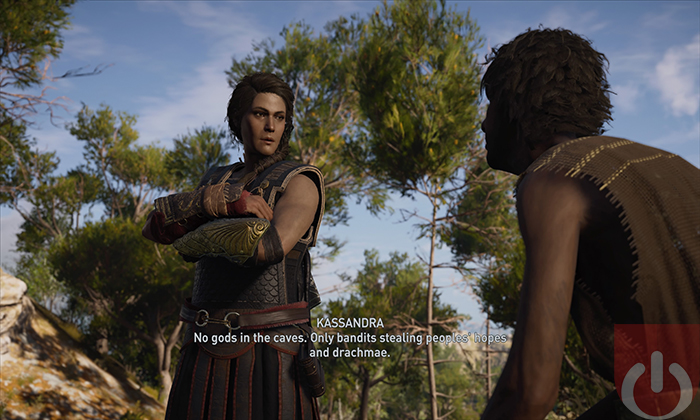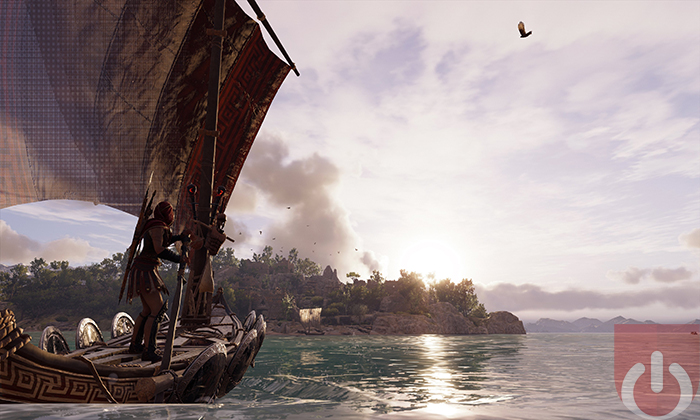Assassin’s Creed: Odyssey
Assassin’s Creed: Odyssey feels like it’s the Assassin’s Creed game made for people that don’t usually like Assassin’s Creed. The slow-paced stealth gameplay and repetitive missions always turned me off of the series, but Odyssey is a totally different beast. There can still be a lot of stealth missions if you want to play the game that way, but similar to other open world RPGs, that’s all up to you. For the first time in the series, Odyssey lets you truly create your own path through the lineage of the ancient order of Assassins and I found myself caring more about the world and its characters because of it.
Assassin’s Creed: Odyssey is full of a lot of firsts for the series. For example, this is the first time you’ve been able to choose between either a male (Alexios) or female (Kassandra) main character at the start of the game*. Regardless of who you pick, you’re the grandchild of King Leonidas of Sparta. Your adventure begins on a small island where you owe some bandits money and you spend the first few hours of the game handling that.
Just like in other recent Assassin’s Creed games, the sci-fi elements are mostly downplayed to give the historical setting more of the spotlight narratively. Odyssey’s semi-historical Greece is absolutely enormous, with tons of islands peppered across the ocean to explore. As a point of reference, at the four hour mark I was just being shown the title screen for the first time, implying the game was finally about to actually begin.
The new focus (or rather, lack of focus) might not appeal to a lot of people. Previously, the Assassin’s Creed series had a very definitive identity as a game about sneaky people in hoods stabbing people without being seen but that isn’t really the case anymore. All of the new systems do work well together and fit the setting, but something is lost by way of trying to be something for everybody. Another example of how Odyssey is a big change for the series is just how heavily it leans into its open world RPG underpinnings instead of its action-adventure stealth game roots. When you start a new game and need to pick a difficulty setting, the options ask you how familiar you are with RPG mechanics, not how familiar you are with Assassin’s Creed or action games. It’s a minor thing, but it set the tone for the whole journey.
Combat, at its core, is mostly unchanged from Origins. You lock onto enemies and attack using the shoulder buttons, then parry attacks by pressing both R1 and L1 at the same time. Holding L2 pulls out your bow for ranged attacks. If you are hidden in grass, behind cover, or out of line of sight you can crouch down to try and assassinate enemies. In this way all three facets of combat (dubbed Ranged, Warrior, and Assassin in the menus) are represented and viable. Most of the time I found myself beginning an encounter with stealth and trying to do as much as possible that way before inevitably slipping up, requiring me to go all out or just decided to bust out my sword to cut down the last few enemies. Unlike in most past Assassin’s Creed games though, you don’t feel punished for doing this. It’s just another way to play the game.
Other parts of Odyssey’s evolution into a full-blown RPG include branching dialogue, important decisions at the ends of quests, and an entire quest journal. You’ll collect loot and be able to mix and match pieces of gear, equip a huge variety of weapons and more. You’ll also wander around towns talking to NPCs and earn XP for pretty much everything you do. When you level up you can spend points on one of the three combat-focused trees – just like pretty much every other AAA open world game in recent memory.
Something that I’ve really grown to love about Odyssey is how great it is about catering to whatever you like to do. A great example of this is the open sea sailing gameplay, which is awfully similar to Black Flag. If you really want, Odyssey could totally just be a Greek pirate game where you go after bounties, hunt down bandits, and explore the uncharted waters. Or you can spend most of your time on land, completing quests, and filling in details across your map. Instead of having a more traditional multiplayer mode of some kind, Odyssey incentivizes you to take photos using its robust photo mode. When you take a photo it gets saved at the specific location on the map. Then when you’re on the map you can toggle seeing your photos, friend’s photos, or all photos. I don’t think it’ll take long for that map to get absolutely covered in amazing images from Greece.
One of the systems that definitely doesn’t work well is the Mercenary system. While playing Odyssey you can piss off the wrong people and have a mercenary hired to track you down and kill you. They’re all named and have very specific bonuses and negatives to pay attention to. In theory it’s like Shadow of Mordor/War’s Nemesis system, but in practice it’s far from that elegant. The mercenaries seem to always just rubberband to your location and follow you around everywhere. Early on they’re tough, but once you get past the dozen hour mark you’re probably strong enough to take down enemies a few levels higher than you without much trouble. That said, regardless of whether they posed a serious threat or not, they were still annoying to deal with.
There are a ton of great things to do while playing Odyssey. Just exploring Greece is rather entertaining thanks to the aforementioned photo mode. The game’s story is also worth sticking to – much to my surprise, the campaign is actually intriguing. I won’t spoil what makes it so, only to say that Ubisoft has done a great job of sprinkling in plot twists throughout the journey to keep players hooked. I’d recommend going with Kassandra at the start of the game; while technically both characters have the same story, Kassandra’s voice acting and personality were much more enduring.
Assassin’s Creed: Odyssey really surprised me. The vistas are gorgeous, gameplay is varied and addictive, and the pacing between its excellent quests is great. I actually found myself invested in the side quests and wanting to explore as much of the islands as possible. While the change in design for Odyssey could be construed as a negative for its lack of focus, the new elements do a good job of at least keeping things fun and varied from start to finish.
*Yes. We know that Assassin’s Creed: Syndicate allowed players to play as a male and female character. That said, in Odyssey’s case, you’re picking one as your main as opposed to swapping between two characters.
Gameplay:
9
Combat in Assassin’s Creed: Odyssey feels like another massive evolution for the franchise. While stealth can still play a big part when engaging foes, the overhaul to ranged and melee combat is impressive and deep.
Graphics:
9
From the vast, sparkling oceans and lush forests, to sprawling hillsides and populated cities, ancient Greece is teeming with life and detail. Odyssey’s impressive photo mode helps make it easy to capture all of the best moments.
Sound:
8
While Alexios’ voice actor comes across as a bit stiff and boring, Kassandra steals the show as the better player character. The soundtrack is grand and sweeping and I particularly enjoyed how your crew sings while sailing.
Replay Value:
8
There is a ton to do and see in Odyssey, but with how diverse and massive of a game it is (with lots of choices and alternate playstyles) you could easily play this 40+ hour adventure more than once.
Final Score:
8.5
